ED & CBI - Jurisdication, Powers & Controversies
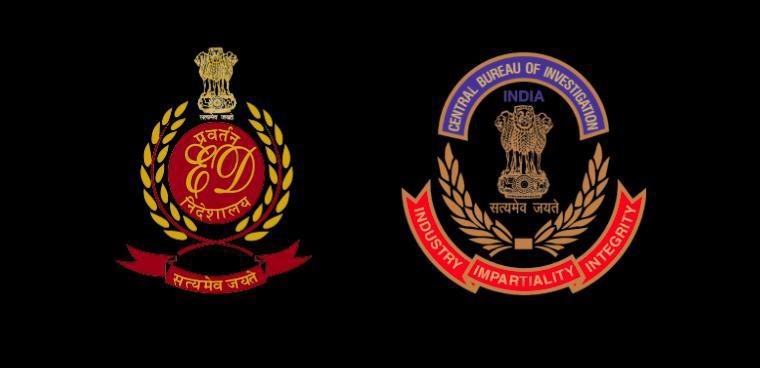
Context:
- Ruling Governments are often accused of misusing the power of various agencies under their jurisdiction.
- In the recent meeting of the I.N.D.I.A bloc with the Election Commission, the I.N.D.I.A bloc alleged that the central government has indulged in "blatant and brazen" use of state power, citing instances such as the arrest of a sitting Chief Minister of Delhi.
1.
Highlight the key differences & similarities between ED and CBI?
| Feature | ED | CBI |
|---|---|---|
| About the body |
|
Role of CVC:
|
| Appointment of Director |
|
|
| Jurisdiction |
|
|
Similarities between ED and CBI:
- Both are under administrative control of the Central Government.
- Both are neither Constitutional nor Statutory Bodies.
- Both fight against economic crimes in India.
2.
What are the Constitution/Legal provisions for ED/CBI?
Both ED and CBI are non constitutional and non statutory bodies. The legal provisions for both ED and CBI are enlisted below:
| ED | CBI |
|---|---|
|
The functions of the Directorate include enforcement of following Acts:
|
|
3.
What are some amendments made in laws related to CBI & ED?
| ED | CBI |
|---|---|
|
|
The President issued two ordinances in November 2021 that gave the Central Government permission to increase the terms of the CBI and Enforcement Directorate directors from two to five years.
4.
Is ED more powerful than CBI?
| ED | CBI |
|---|---|
|
|
|
|
|
|
|
|
|
|
|
|
5.
Enlist such agencies in other countries?
| Country | Agency |
|---|---|
| USA |
|
| UK |
|
| France |
|
| Germany |
|
6.
How UPA /NDA Used/Misused ED/CBI?
| Country | Agency |
|---|---|
| Shri Pankaj Chaudhary, the Union minister of state for finance, told the Lok Sabha in a written response, "Till March 31, 2022, ED recorded 5,422 cases under the PMLA, attached proceeds of crime of Rs 1,04,702 crore (approximately), and filed prosecution complaints (charge sheets) in 992 cases, resulting in the confiscation of Rs 869.31 crore and the conviction of 23 accused." | According to the Central Vigilance Commission (CVC) annual report, the conviction rate of CBI is as high as 65 to 70%, which is comparable to the best investigation agencies in the world. |
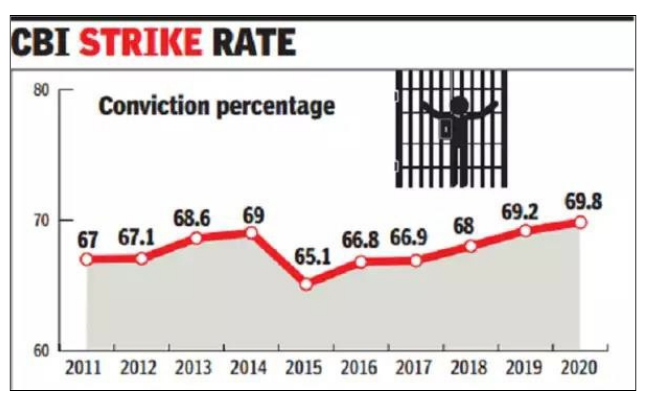
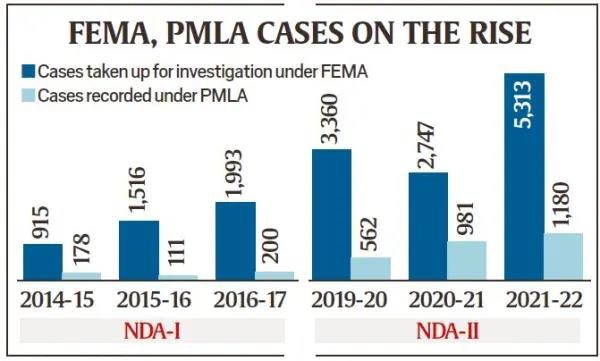
7.
What are the Criticisms related to ED and CBI?
| ED | CBI |
|---|---|
|
Wide Powers: The ED has a set of powers that even CBI or state police forces don’t have. These are:
|
Limited Powers:
|
|
Transparency:
|
Political Interference:
|
|
Enforcement Case Information Report (ECIR):
|
Lack of Accountability:
|
|
Use of PMLA for ordinary crimes:
What’s the predicate offense?
|
|
|
Low conviction rates:
|
|
|
Political tool:
|
8.
What was the controversy in the appointment of director of ED and CBI?
| ED | CBI |
|---|---|
|
|
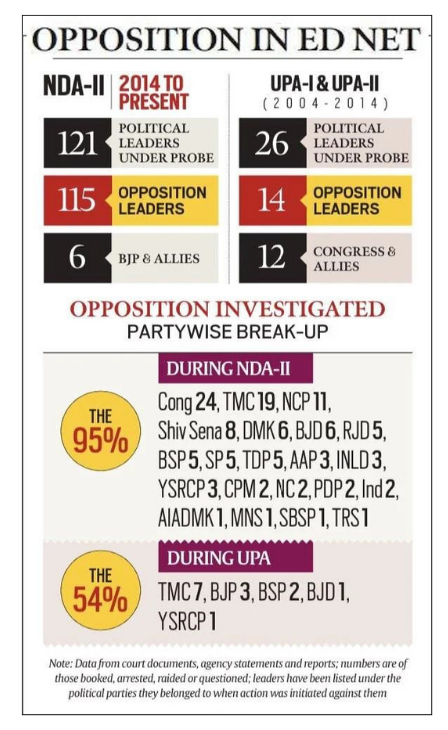
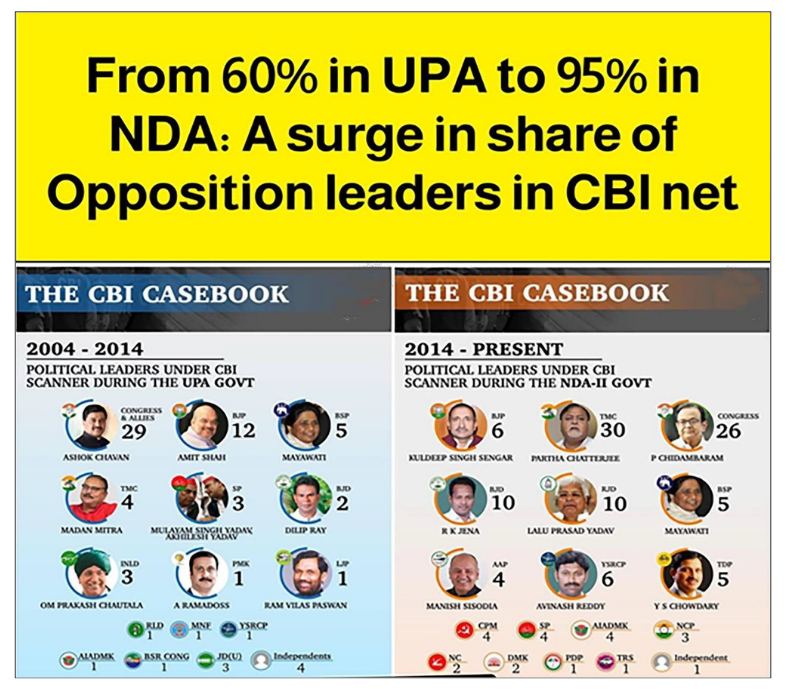
9.
What is the recruitment process for CBI & ED?
| ED | CBI |
|---|---|
|
|
|
|
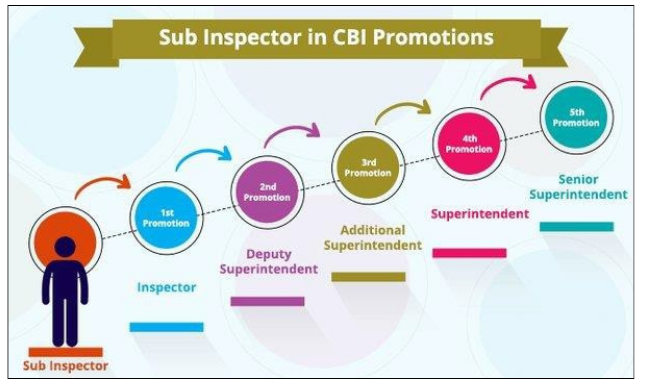
10.
What is the organizational structure of CBI & ED?
| ED | CBI |
|---|---|
|
|
|
|
ED’s Organisational Structure:
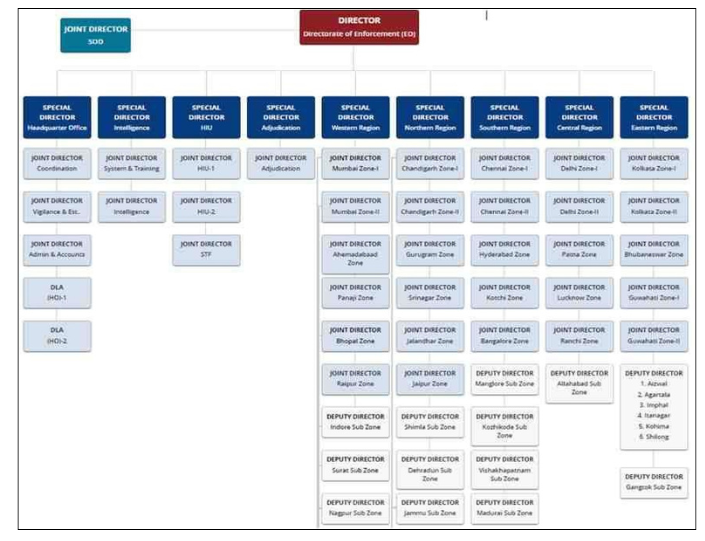
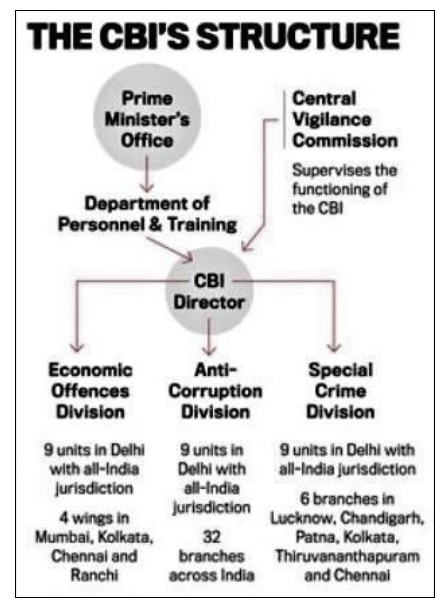
11.
What is the relevance of the topic for UPSC CSE?
GS Paper 2:
- Constitutional and non-constitutional bodies
- Government Policies and Interventions
GS Paper 3:
- Money Laundering
A Previous Years Mains Question:
Q1. The jurisdiction of the Central Bureau of Investigation (CBI) regarding lodging an FIR and conducting a probe within a particular state is being questioned by various States. However, the power of the States to withhold consent to the CBI is not absolute. Explain with special reference to the federal character of India. (2021)
Some Questions from this Year and Previous Years Interview Transcripts
Board BB Siwan sir:
-
Why can't ED and police work together in TN ?
-
What are the issues ?
Board Dinesh Dasa sir:
-
Tell me what would you do as a state police officer if ED/CBI comes to your state for investigation?
-
Would you do the same if the Home minister transfers you again and again?
Board Dinesh Dasa sir:
-
What do you think about the clashes between state police and ED CBI?
Board Dinesh Dasa sir:
-
Can movies influence judicial outcome(CBI petition that a movie could influence witness)
Board Dinesh Dasa sir:
-
Why do people ask for a cbi investigation in a case?
-
There is a CID in state police. In CBI too, its cadre is there, how it's functioning is different from state police.
-
There are demands for cbi investigation in many cases? Why?
-
If things go like this, the organization will be overburdened. How cases are decided in CBI.
Board Suman Sharma mam:
-
Tell about CBI general consent and some follow up questions?
Board Manoj Soni sir:
-
What about the Collegium system ?
-
Collegium for CBI and ECI
Some Questions for QUIZ
Q1. Consider the following statements regarding Enforcement Directorate (ED):
1. It is under the administrative control of the Department of Revenue.
2. The ED Director is appointed by the central government on the recommendation of a committee chaired by the Prime Minister.
3. ED is responsible for enforcement of the Foreign Exchange Management Act, 1999 (FEMA), and certain provisions under the PMLA.
How many of the above statements are correct?
(a) Only one
(b) Only two
(c) All three
(d) None
Q2. Consider the following statements regarding Central Bureau of Investigation (CBI)
1. It is a statutory body created under the DSPE Act, 1946.
2. It functions under the Ministry of Home Affairs.
3. It is also the nodal police agency in India which coordinates investigations on behalf of Interpol Member countries.
How many of the above statements are correct?
(a) Only one
(b) Only two
(c) All three
(d) None
Q3. Consider the following bodies.
1. Central Bureau of Investigation
2. State Human Rights Commission
3. Niti Aayog
4. Enforcement Directorate
5. National Consumer Disputes Redressal Commission
How many of the above bodies are neither constitutional nor statutory in their origin?
(a) Only two
(b) Only three
(c) Only four
(d) All five
Some Questions for POLL
Q1. Is ED misused by the ruling governments?
(a) YES
(b) NO
(c) Can’t say
Q2. Does CBI enjoy Independence in functioning?
(a) YES
(b) NO
(c) Can’t say
Q3. Should CBI & ED be made Constitutional Bodies?
(a) YES
(b) NO
(c) Can’t say
QUICK LINKS